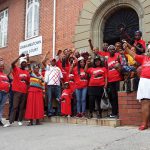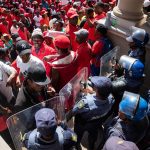Activist Ayanda Kota fears for his life
The leader of the Unemployed People’s Movement is in hiding after being warned about a plan to assassinate him. It is no idle threat in a province where political murders are rife.
Author:
4 June 2020

“It has become normal that those who seek the recourse of justice are always living in fear, but those who plunder and loot, they just walk free. How can those who are seeking justice be protected?”
So says the leader of the Makhanda-based Unemployed People’s Movement (UPM), Ayanda Kota, who was told on 29 May by sources in the ANC that a hit had been ordered on his life. He is no longer sleeping at home with his family and has stopped his work with the UPM. “I have not slept well ever since. I am struggling to make sense of this,” he said.
But, he added, such threats are nothing new. “We have always lived in fear. The former chairperson of the UPM, Gladys Mphepho, was once told by ANC members that they would cut her breasts off. Some ANC members who are sympathetic to us often tell us to be careful.”
A decade ago, during a seminar on the so-called Secrecy Bill at the university currently known as Rhodes University, an ANC member told Kota that he knew where he lived and that he would die. Two years later, Kota was beaten by several police officers in front of his young son inside what was then the Grahamstown Police Station. He had been arrested for not returning two books that a lecturer had lent him, despite having offered, in writing, to replace the mislaid books.
More recently, says Kota, he was tipped off that a plan was afoot to discredit him. Although he has been threatened with death several times, like some other members of the UPM, Kota was told that this time “it was serious”.
Councillors feeling threatened
On 14 January, the Grahamstown high court ruled that the Makana Local Municipality council must be dissolved because it had failed in its constitutional duty to provide basic services to residents. The court case was instituted by the UPM. On 21 May, the high court refused an application for leave to appeal brought by the municipality and provincial government. On 29 May, Eastern Cape premier Oscar Mabuyane said the provincial executive would now approach the Supreme Court of Appeal. It was on this day that Kota was told he would be assassinated.
Related article:
“The UPM has done nothing wrong to anyone,” said Kota. “But some [councillors] think our court case is about their bread. The councillors think we are after their jobs. For them it is not about the bigger picture of delivering services.”
In a statement responding to the threat to Kota’s life, the UPM said: “Threats against the UPM, a social movement that seeks to correct administrative anomalies that have resulted in poor service delivery, cannot be countered by acts of violence against its members. We implore all that are involved in attempts to physically harm Kota or any other member of the UPM to refrain from doing so. Genuine community-building efforts must be embraced by all without violence or rancour.”
Dogged by threats
Another activist who has faced constant death threats over the past decade is S’bu Zikode, president of the shack dwellers’ movement Abahlali baseMjondolo. Several members of the movement have been assassinated.
“We have buried 18 comrades already in our movement,” said Zikode. “We understand the pain of children without fathers, the pain of being a widow, of losing a son or daughter. We call on genuine democrats and progressive forces, even within the ANC, to reject the politics of blood and death. Hitmen and corrupt politicians must be exposed and prosecuted.”
Reflecting on the threats he has had to live with, Zikode said: “The extent of death threats can be terrifying. There were moments where I never had an appetite for food of any sort. There were moments where I experienced sleepless nights, when I had accepted that death was inevitable.
Related article:
“I had to think much more about the things I believe I have come to the earth to do and achieve, as per my duty to God and my country, and the things I had not achieved in life. One of these things were the ages of my children, especially the last born, and her level of education. How will she be in life without a dad?” said Zikode.
“We remain committed to a non-violent project, and our struggle against the politics of blood and terror should be supported by all progressive forces. We say to the UPM and comrade Kota, we are all Kota. The people of Makana deserve clean governance. Having said that, comrade Kota must be very careful. We know what some councillors and politicians are capable of.”
Political intolerance
The Sakhisizwe Civil Society Structures Forum has been working with the UPM and plans to bring a similar court case against the Sakhisizwe municipality, which includes the towns of Elliot and Cala. The Cala University Students Association, an affiliate of the forum, has also condemned the threat against Kota.
“All Kota is doing is to fight for the recognition of rights of people,” said Fani Ncapayi, a forum representative. “So if this is true, we are going back to the dark days of apartheid where anyone who expressed different views to those in authority would be assassinated. This could also be a reflection of political intolerance by people who have different political views.
Related article:
“All people who value the lives of ordinary people, who are committed to fighting for a just society where poor people’s lives are valued, should not fold their arms. It is time for all of us to stand up so that the few who stand up are not victimised,” Ncapayi added.
Mabuyane’s spokesperson, Mvusiwekhaya Sicwetsha, was unsympathetic. “There is no one in the ANC and in the municipality who can do that [threaten to assassinate an activist]. Any person who has received such a tip-off, as alleged, must report that to the SAPS and not just toss this claim to journalists. It is the responsibility of the SAPS to investigate such allegations and to protect people if such claims are verified,” said Sicwetsha.
The Makana municipality did not respond to requests for comment.
Emboldened by impunity
University of Johannesburg journalism professor Jane Duncan, who has worked closely with Kota in the past, said: “The faceless threats against Kota are shocking but not entirely surprising. Kota has been a thorn in the side of the municipality and the local ANC for years, and he is highly effective as an activist.”
Duncan said death threats and assassinations have become the weapon of choice to harass and silence activists. “This weapon is so effective and the possibility of evading accountability is high. Threats and killings have become ways of doing under the cover of darkness what cannot be done openly. The NPA [National Prosecuting Authority] has a poor record of bringing assassins to book … A rare exception to the near-impunity that assassins or would-be assassins have enjoyed was the prosecution of the killers of Abahlali leader Thuli Ndlovu – two ANC councillors,” she added.
Duncan said the availability of hitmen for hire, the relative impunity with which they operate and the growing importance of municipal politics for local elites to accumulate wealth create a climate for political assassinations to flourish.
Combined with a lack of economic opportunities, “losing power can mean losing income for a very long time, if not for life, which turns the need to maintain power into a life-and-death struggle, where the grip on the levers of local power must be maintained by any means necessary”, said Duncan.
She said it is important that the Makana municipality distances itself from the threat against Kota and the UPM and condemns it in the strongest terms.
A history of assassinations
Most political assassinations have happened in KwaZulu-Natal, but they are increasingly common in the Eastern Cape too. Several whistle-blowers against corruption in the province have been killed or forced into hiding in the past year alone. The deaths are all being investigated as political assassinations. Provincial police spokesperson Sibongile Soci confirmed that the investigations were continuing, but would not comment further.
The modus operandi in these hits was similar. Each person was shot at by one or two gunmen as they arrived home after work or as they left home in the morning, or by people who burst into their homes and opened fire. In all the cases, the gunmen fled quickly without robbing any of the victims.
Bongani Cola, a shop steward for the Democratic Municipal and Allied Workers Union of South Africa, was gunned down in the driveway of his home in New Brighton, Port Elizabeth, at about 5am on 4 July 2019. Cola was a plumber in the Nelson Mandela Bay Metropolitan Municipality and an outspoken advocate against corruption and the outsourcing of labour. The police have never made any headway in the case.
Related article:
In September 2019, Petros Ntamnani, the supply chain manager at Amathole District Municipality, was shot at 11 times by two men as he was driving home in Ginsberg, King William’s Town. He survived and went into hiding. Ntamnani told the Daily Dispatch that he had been “assisting investigators who were looking into the corrupt awarding of tenders” at the municipality.
On 24 January this year, the assistant director of supply chain management at the Amathole municipality, Thandile Mbono, was gunned down as he was leaving home for work. He was a member of the South African Municipal Workers Union (Samwu). At the time, municipal workers had planned a strike over alleged money wastage by the municipal manager. Peoples Dispatch reported that just before his death, Mbono had sided with municipal workers and told a Samwu meeting that he had information about financial irregularities in the municipality. Exposing these irregularities, he said, would lead to a “permanent solution” to the workers’ problems.
Just five days later, on 29 January, an Independent Municipal and Allied Trade Union member in the same municipality, Simphiwe Mdingi, 38, was also gunned down in his driveway. Mdingi was a senior accountant and the manager of revenue unit at the municipality. He was shot nine times as soon as he arrived at his home in Amalinda, East London.
A further 11 people were killed in Nelson Mandela Bay in alleged hits between January and February 2019. They were Siyabulela Vena, 40, Akhona Josah, 26, Vuyani Ndike, 40, Themba Makalima, 25, Sabelo Ngquphe, 30, Baba Ningi, 48, Nkululeko Gcakasi, 44, Pamela Ngamlana, 27, Marina Ntamo, 37, Ludwe Papu, 42, and James Pietersen, 42. The Sunday Times reported that all 11 owned small businesses and were hoping to participate in a R21 million drain-cleaning tender that was going to be divided among the city’s small, medium and micro enterprises.
The Hawks revealed at the time that they were in possession of two WhatsApp voice messages related to the murders. In one, a person said: “We have killed two … We need to kill two more before the end of this week, hiding in Kirkwood.” In the other, a person said: “Ensure that you park your vehicles at home … but if you are brave you can drive your car but be warned you will have a meeting with your ancestors. As from Wednesday, blood is going to be spilled. Those hiding in Kirkwood, we will kill them as our victory celebration.”




